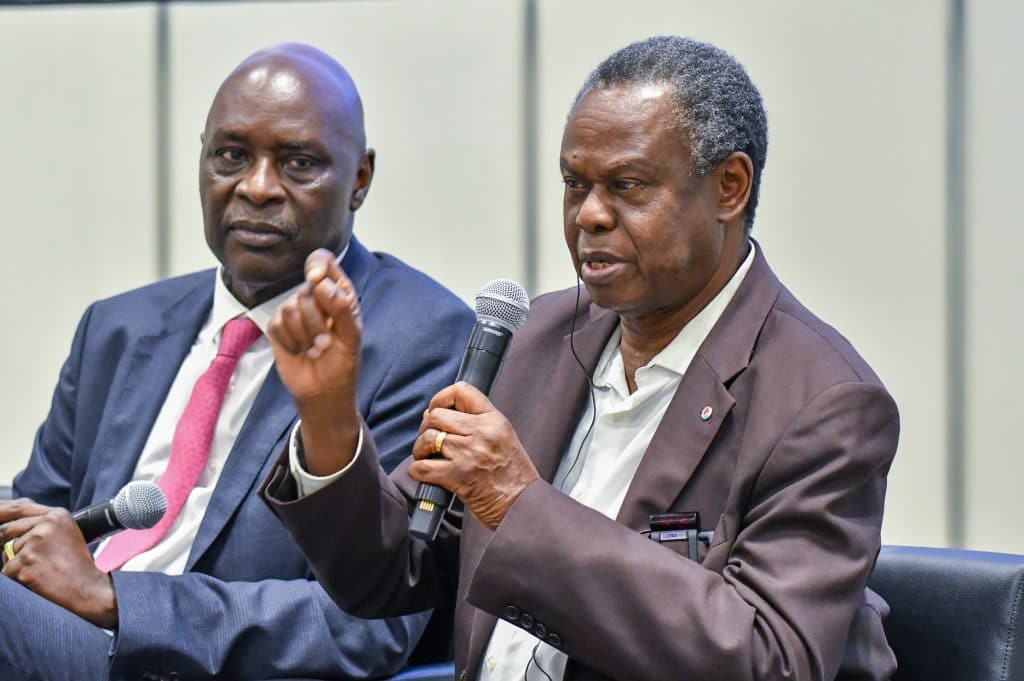On the sidelines of the 7th Tokyo International Conference on International Development (TICAD7), the Japan Center for International Exchange partnered with IntraHealth International to organize an official side event on “Health Workforce Investment as a Driver of UHC and Economic Development.” Over 120 participants representing government, NGOs, academia, and international organizations took part in a rich discussion on the wide-ranging benefits of health workforce investments not only for furthering health goals but also goals in interrelated fields such as education, gender equity, labor, and inclusive economic growth.
For more, see:
IntraHealth Urges Investment in Community and Primary Health at TICAD (IntraHealth, September 10, 2019)
We’re Missing Something in Health Worker Training (IntraHealth, September 11, 2019)
Opening Remarks
Prof. Keizo Takemi, Member, House of Councillors, Japan; Senior Fellow, Japan Center for International Exchange (JCIE)
Keynote Speech
Hon. Kwaku Agyaman-Manu, Minister of Health, Republic of Ghana
Stories from Sub-Saharan Africa
Dr. Olum Samson, Acting Head of Human Resource Management, Ministry of Health, Republic of Uganda
Dr. Janet Muriuki, Deputy Chief of Party and Technical Director, HRH Kenya Mechanism, IntraHealth International
Dr. Mari Nagai, Senior Expert, Division of Global Networking, Department of GLobal Network and Partnership, Bureau of International Medical Cooperation, National Center for Global Health and Medicine (NCGM)
Dr. Hanako Jimi, Member, House of Councillors (LDP), Japan
Dr. Gerard Schmets, Coordinator of Universal Health Coverage and Life Course, World Health Organization (WHO)
Dr. Akiko Maeda, Health Economist and Health Policy Analyst
Dialogue for the Future of Health Workforce Development in Africa
Prof. Francis Omaswa, Executive Director, African Center for Global Health and Social Transformation (ACHEST)
Mr. Pape Gaye, President and CEO, IntraHealth International, USA
Hon. Keizo Takemi framed the discussion by drawing attention to a number of key bottlenecks—including the lack of current data, poor working conditions driving poor quality of care, and gender imbalances in both health workforce and health outcomes—that drive chronic underinvestment in health workers, particularly in Africa. Ghanaian Health Minister Kwaku Agyaman-Manu shared his country’s experience in scaling up its health infrastructure to achieve UHC, citing health worker scale-up—particularly of midwives, nurses, and general practitioners—as the most urgent challenge in this endeavor.
A panel of health experts then shared their efforts in addressing health worker scale-up in Sub-Saharan Africa. Dr. Olum Samson of the Ugandan Ministry of Health shared a number of new initiatives being put in place to address challenges faced by health workers, such as gender discrimination in the workplace as well as the occupational health and safety of frontline health personnel working to contain the country’s Ebola outbreak. Dr. Janet Muriuki of IntraHealth International described how a public-private partnership in the form of an educational loans—the Afya Elimu Fund—is helping low-income students afford the cost of medical training in Kenya, and Dr. Mari Nagai of the National Center for Global Health and Medicine described a networking database of health workers throughout 13 francophone African countries that played a critical role in helping Senegal to identify and recruit the health workers needed to contain the country’s 2014 Ebola outbreak.
A number of panelists also spoke from the perspective of bilateral and multilateral partners. Japanese parliamentarian Hanako Jimi reflected on Japan’s 70-year postwar history in which a medical certification system that included a broad range of health professionals—including nutritionists, speech therapists, and occupational therapists—helped the country to achieve UHC while still a developing nation in 1961. 3.5 billion people or half of the global population currently lacks access to basic health services, and Dr. Gerard Schmets of the WHO described how investing in health workers can help close this gap while also improving the economy as a whole, citing a study in Côte d’Ivoire that demonstrates how a 1% increase in health worker wages can result in an 0.56% increase in GDP, 2.5% increase in household income, and 0.32% increase in the employment rate. Health economist Akiko Maeda drew attention to the often-undervalued “soft” skills, such as teamwork and emotional intelligence that are so crucial in ensuring the quality and success of health interventions, as well as to new skills around big data and AI that will become increasingly important factors in health worker scale-up.
The panel was followed by a lively discussion between Francis Omaswa, executive director of the African Center for Global Health and Social Transformation and laureate of the 3rd Hideyo Noguchi Africa Prize, and Pape Gaye, president and CEO of IntraHealth International. Reflecting on the development and current state of the health-worker movement, Prof. Omaswa decried the lack of political will among African leadership in promoting health worker development and made a bold appeal for “Health Workers in All Policies” to emphasize the multi-sectoral benefits of investing in health workers. To underscore the wealth of human resource potential offered by Africa’s demographic dividend, Mr. Gaye ended by pointing out the incredible opportunity facing the continent if political leaders can prioritize and make use of this young potential health workforce not only to address health worker gaps at home and in the region, but around the world as well.

